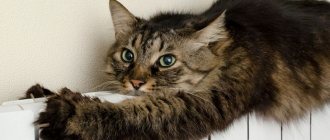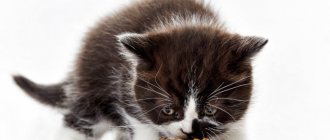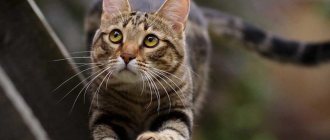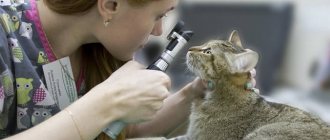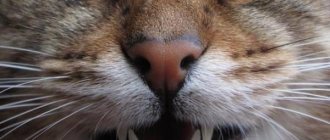Reasons when a cat hides in dark places
A cat may be hiding because, for example, it is tired of its owners’ small child and just wants peace. But it happens that the cat does not come out when called and does not respond to the rustling of food for a long time. The reasons for this behavior need to be understood. Why does a cat hide in dark places?
Cats love the most secluded places
Stress
The main reason for hiding in cats is stress. A sudden move, a visit to the veterinarian, guests, fireworks outside the window... The cat hides for any of these reasons and may not come out of hiding for a long time. Each cat is an individual, and animals with a strong psyche may not react in any way to changes in the house. But fearfulness in cats is also normal. This is a natural defense mechanism against danger.
Fear
Stress and fear always go hand in hand. A cat hides in dark places if it feels bad, in pain, or is very scared. The desire to hide can be caused by the following situations:
- New house. It is normal for a kitten to hide, run away, and sit in a secluded place for a long time. This is an adequate reaction to moving; the cat just needs a little time to get used to it. An adult cat can behave exactly the same when changing owners. She needs more time to adapt than a kitten. At night, an animal in a new house can come out, explore the apartment and meow invitingly. Such behavior should be treated with understanding.
- New animal in the house. Buying, for example, a puppy can cause severe fright in a cat. It is advisable to prevent contact between a cat and a dog at first and gradually accustom them to each other. Adult animals need more time than babies. It may take a month or more for a cat and dog to adapt to each other.
- Unusual smell. Cats navigate with their nose. And a new smell can greatly frighten your pet. There have been cases where a cat hid in horror when the owners smothered themselves with perfume before going out into the world. The animal simply did not understand what was happening and why it smelled like that.
- Fireworks. New Year is the most stressful time for cats. The rumbling outside the window causes not only horror and a desire to hide in a far corner, but also an exacerbation of chronic diseases, if any. For example, idiopathic cystitis, which is manifested by the fact that the animal cannot pee for more than 6 hours. At the first symptoms, you should contact a veterinary clinic.
- Arrival of guests. If a cat is cowardly, then his sudden escapes to secluded places should not be surprising. The main thing is not to drag the animal out by force to show it to guests. This is very stressful for the cat.
- After the trip. A cat that has been released from its carrier after a trip or visit to the doctor will immediately seek shelter. Or maybe he won’t want to leave his portable bag. In this case, it is better to leave the cat alone.
- A cat or cat may hide in the corners to mark this place. This problem is solved by sterilization or castration.
Important! After surgery, it is recommended to limit the animal's mobility. It is undesirable for the cat to hide and be out of reach. It is important that the animal is visible.
Pregnancy and childbirth
One of the harbingers of an imminent birth is a cat’s sudden desire to create a “nest” for future offspring. A cat may dig through the bed, throw out things in their closets, and hide on shelves.
Important! This is normal behavior for a woman in labor.
It is advisable not to lose sight of the cat, but also not to interfere with its activities. Better yet, prepare a place for the cat to give birth. This can be a closed box with a cut out exit or a special basket with a blanket or blanket.
It is better to prepare the place for childbirth in advance
A game
In a playful mood, cats may hide from each other only to attack suddenly. This game is not dangerous. There are cats that attack their owners from hiding, considering them to be prey. Usually this is harmless and small predators do not extend their claws in such games.
Viruses and diseases
A cat that isn't feeling well is looking for a dark place to hide. With viral diseases, a high temperature usually rises, and the animal persistently goes to the bathroom, where the floor is cold, or simply looks for a dark, quiet place. Most cats prefer to be sick alone.
What are the dangers of stress for cats?
It has been scientifically proven that many serious disorders in an animal’s body begin against a background of fear and nervous disorders. Practice confirms, for example, that such a rare phenomenon as pulmonary edema occurs precisely against the background of severe mental shock. A veterinarian anesthesiologist talks in more detail about all the dangers of stress in cats:
Anorexia
Refusal to eat provokes a lack of nutrients necessary for the normal functioning of the body. First of all, the digestive system is impaired. Insufficient nutrition provokes disruptions in the functioning of the stomach, intestines, and liver. The risk of gastritis, ulcers, and skin diseases increases. Prolonged stress threatens complete exhaustion. Lack of nutrients initiates cellular catabolism. After complete consumption of fat reserves, the breakdown of body proteins begins. The animal becomes painfully thin.
Cystitis
The genitourinary system in cats, like in other living organisms, is subject to neurohumoral regulation. Inhibition processes in the nervous system contribute to urination disorders. As a result of a nervous disorder, the pet may miss timely urges to go to the toilet. In the presence of accompanying factors, urinary retention in the bladder contributes to the development of bacterial flora. This often causes cystitis. In such a situation, it is necessary to treat not only the cat’s nervous system, but also inflammation of the bladder.
Constipation
global $ads_google;
//data-ad-slot=”2475549904″ $ads_google = empty($ads_google) ? false : true; ?> if ($ads_google == false) {?> $ads_google = true; ?> } ?> Often, moving, the arrival of a new tenant in the house, or overexposure cause physiological constipation in a cat. Impaired intestinal motility is one of the common consequences of stress in cats. Chronic constipation, in turn, is dangerous due to colic, obstruction of the intestinal tube, and inflammation.
In some cases, stress in a cat increases gastrointestinal motility and manifests itself in the form of diarrhea.
Other consequences
Neuroses affect the immune system, which provides protection against viruses, pathogenic bacteria, and fungi. This is especially dangerous for small kittens, who, due to their age and incomplete immunization, are less resistant to various infections.
Neuroses threaten the cat's cardiovascular system. Rapid heartbeat, sudden rushes of blood due to attacks of fear, increased blood pressure contribute to the development of heart and vascular diseases. As a result, the general blood supply to the body is disrupted.
Can a cat die from stress?
Many owners do not attach much importance to cat fears, considering them temporary and harmless phenomena. In the first and second stages, when stress in a cat manifests itself in the form of behavioral and physiological symptoms, there is no threat to life. However, the third stage of neurosis is considered extremely dangerous for a pet. Metabolic disorders entail complete depletion of the body's internal reserves. A protracted pathological process that is ignored by the owner is dangerous and fatal.
In what cases should you not worry?
Why does a cat walk past the litter box: the main reasons and what to do
There is no need to worry if your cat has been inclined to hide and sleep in secluded places all its life. It may be worth setting up a special place for her so that she feels comfortable and safe there.
Some cats like to hide their prey in corners. The prey could be a stale cracker from the kitchen, or maybe a mouse (if the animal goes outside). It is better to check cat “hiding places” in time.
A few rules on how to behave with a “secretive” cat:
- Under no circumstances should you drag out a cat by force, much less punish it for hiding. This will not rehabilitate the cat, but it will ruin its attitude towards its owners.
- If the cat is prone to “hide and seek” or a kitten has appeared in the house, it is necessary to close access to dangerous places as much as possible. For example, where household chemicals are stored, where an animal might get stuck (sofa, closet) or where it might fall.
- It is normal for a cat to hide in dark places when a new animal appears in the home. Animals need to be given time to adapt.
- When planning renovations or rearranging furniture, it is better to keep your cat out of the room where all these activities take place. If possible, it is better to give the cat for foster care during repairs, since fine dust from the work is dangerous for animals.
- If the cat used to walk outside, then when moving to a new house it is better not to let the animal out for the first couple of months. Your pet may get confused and look for the way to the old house. It always takes time to adapt to a new place.
- It would be best to set up a “cat corner” where your pet can relax, sleep, play and sharpen its claws. Pet stores have a huge selection of cat houses with different numbers of floors. You can choose one to suit every taste and budget.
- When traveling to the country, it is also better not to let the cat out at first. She may be scared of the street. And, for example, climbing a tree far from home and not being able to get down or hide under a car.
Cat house option
Causes of stress
Foaming at the mouth in a cat: causes and options for what to do
Cats that live in special love, care and attention are less likely to be stressed. They are also distinguished by their particular stability and balance, but any irritating external factors can lead the pet into a slight panic.
External circumstances:
- the appearance of other pets in the house. At this moment, the cat is controlled by jealousy. Reluctance to accept a new member of the household can last for years and develop into long-term depression;
- stress is inevitable if the pet’s daily routine has been extremely disrupted. Food delivered at the wrong time or a delay at work can frighten your pet and make you feel anxious;
- The veterinary clinic is the key reason for all animal fears. Going outside, strange smells, people - all this can lead to stress, and subsequently to extensive hair loss;
- cats, like people, need fresh air; when oxygen is deprived, the animal experiences stress;
- repair. Noises, smells, bustle, dirt, strange people - all this uncertain environment can provoke cat fear or acute stress.
Stress after moving
Moving is also an external circumstance and the most terrible event in a cat’s life. In a new living space, the cat tries to move carefully, constantly stopping at minor rustles. Hide and seek becomes commonplace in this stressful situation.
Note! When moving, it is best to keep your pet close to you and, if possible, pick it up more often. In a new room, you need to walk through the rooms and do a few actions so that your pet feels safe in the new place. And in the near future, avoid sudden overloads (trips to the veterinarian, trips to visit). You can give the drug stop stress or cat-bayun for a more painless adaptation.
Moving with a cat
Fright
During and after a fright, the animal may experience stress. Fright can be caused not only by a long absence of the owner, but also by a banal loud sound or a sudden drop of an object on the pet. If after this the animal experiences tremors, it is necessary to relieve the tension with medication.
Noisy places are scary
If a pet has lived in an apartment all its life and has no idea about the street or moving to public places, then any experiment with travel can result in prolonged chronic depression.
Diseases and physiological causes
It's not just humans who experience illness or physical pain that can cause stress. Animals react more sharply to these factors due to their vulnerability and sometimes insecurity. One of the most important points that owners do not often pay attention to is parasites.
- Worms disrupt metabolism, lead to intoxication and lead to vitamin deficiency in the animal's body.
- Fleas are external parasites that cause itching and burning, leading the animal to stress and sometimes to aggression. Promote the development of dermatitis.
- Ear and scabies mites provoke persistent subcutaneous itching and also have an acute effect on the psyche.
- Lice eaters disrupt thermoregulation, leading to itching and deep skin pain.
- A number of fungi that affect the animal’s skin and mucous membrane are accompanied by itching or irritation in the tissues.
Photophobia in cats
Why does a cat hide kittens - take them to different places and what to do
With photophobia, the cat will also look for a secluded dark place and squint at the light, as it irritates the eyes and hurts the cat. This may be an alarming symptom indicating the following conditions:
- eye injury (mechanical, chemical, thermal);
- allergic reaction;
- stroke;
- concussion;
- rabies.
Eye injury in a cat
Note! If the animal is not vaccinated and roams freely on the street, then photophobia may be a symptom of rabies. Rabies is deadly for animals and people, the mortality rate is 100%.
At the first symptoms (photophobia, hydrophobia, drooling, aggression), you must consult a veterinarian! It is also necessary to avoid as much physical contact with a potentially infected cat as possible. Rabies is transmitted through the bite of a sick animal when saliva enters the bloodstream.
Stress and fear
Remember that it is the desire to hide that indicates a high level of stress; do not try to force the cat out of its hiding place. The animal may display a passive defensive reaction and severely scratch or bite you.
Usually a cat gives a warning: it presses its ears back, hisses, howls and waves its paw with its claws extended. Leave her alone. If you lead a secluded lifestyle, a noisy holiday and a large number of guests may frighten your cat. There is no need to forcibly grab the animal and try to introduce it to the guests.
Invite one of your friends over for a movie or tea party. If the cat comes to you, then do not pay attention to it. Offer her a treat or toy. Invite guests more often, and the cat will gradually get used to them.
Sometimes cats are afraid of children or men if they have never seen them before or have already had a negative experience. In this case, it is better not to touch the animal, and the negative reaction will fade away by itself. Reward your cat's good behavior with your favorite treat or game.
Contacting a veterinarian
Why does a kitten's whiskers break: the main reasons and what to do
It must be remembered that the best treatment is prevention. A preventive visit to a veterinarian will help identify diseases in the early stages and begin treatment immediately. Your cat also needs to be vaccinated once a year. If desired, you can combine vaccination and a preventive appointment with a veterinarian.
If the following symptoms appear, a visit to the doctor is mandatory.
Lack of appetite
If the cat does not eat, does not want to drink and refuses its favorite treats, and sleeps all the time in a secluded place, a trip to the clinic cannot be postponed. Fasting is strictly contraindicated for cats, since prolonged refusal to eat leads to disruption of liver function.
Lethargy
Lethargy, apathy and drowsiness may indicate severe intoxication or high fever. It is necessary to figure out what could cause this condition. A visit to a veterinarian in such cases is mandatory.
Loss of coordination
If your cat begins to fall over on its side when walking, has difficulty moving its paws, or crashes into walls, a visit to the veterinarian is necessary. Loss of coordination is an alarming symptom and can indicate both vision loss and brain dysfunction.
Another symptom of a concussion or stroke is different pupils
Preventing stress
A few rules to protect your pet from unnecessary stress:
- You should have your own cozy corner, personal space, preferably away from prying eyes;
- It is not permissible to play with an animal against its will (this is usually what children do);
- Praise is the best way to cheer up your pet;
- there must be constant access to the window;
- active games are the best prevention.
Cat and cat
When purchasing a pet, you should carefully approach its care and care, because responsibility for its life lies with the owner. Only a close person is able to understand his psychological or physical state in time and provide assistance as needed. Affection, care and attention are what a pet expects from a person.
